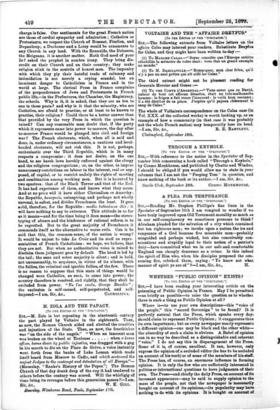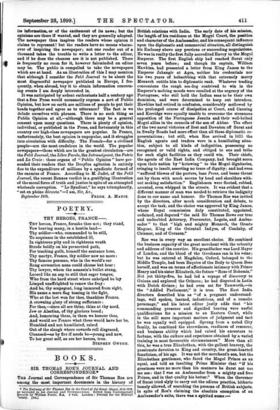WHETHER "PUBLIC OPINION" EXISTS?
[Ti. THE EDITOP. Or THE "c:PECTkTOR
have been reading your interesting article on the poisoning of Public Opinion in France. May I be permitted —as briefly as possible—to raise the question as to whether there is such a thing as Public Opinion at all ?
'Where is—to use your own descriptions—this "voice of the people," this " sacred Sovereign " to be found? It is perfectly natural that the Press, which speaks every days should claim to represent Public Opinion ; it exaggerates thus its own importance; but as every newspaper nearly represents a different opinion—one may be black and the other white— the absurdity of such a claim is obvious. A Babel of opinion can in no way be described as a distinguishable and coherent " voice." I do not say this in disparagement of the Press. Some of it is, of course, excellent. It can, however, only express the opinion of a secluded editor (he has to be secluded on account of his work) or of some of the members of bis staff. The Press has, of course, an enormous influence in forming opinion. It is only the few who are sufficiently interested in politics or international questions to have judgments of their own. The Press—and chiefly the daily Press, on account of its incessant appearance—may be said to supply opinion to the mass of the people, not that the newspaper is necessarily bought on account of its opinions,—its popularity may have nothing to do with its opinions. It is bought on account of its information, or of the excitement of its news ; but the opinions are there if wanted, and they are generally adopted. The newspaper thus inspires the readers whose opinion it claims to represent ! but the readers have no means whatso- ever of inspiring the newspaper; not one reader out of a thousand takes the trouble to write a letter to the editor, and if he does the chances are it is not published. There is frequently no room for it, however fairminded an editor may be. The public is compelled to take the newspapers which are at hand. As an illustration of this I may mention that although I consider the Petit Journal to be about the most disgraceful newspaper published in Europe, I fre- quently, when abroad, buy it to obtain information concern- ing events I am deeply interested in.
It was anticipated by ardent enthusiasts half a century ago that a free Press would necessarily express a sort of Public Opinion, but how on earth are millions of people to put their heads together and agree as to utterance? The fact is we delude ourselves with phrases. There is no such thing as Public Opinion at all,—although there may be a general consent upon many questions. There is plenty of opinion, individual, or published in the Press, and fortunately in this country our high-class newspapers are popular. In France, unfortunately, the best opinion is unpopular, and it struggles into circulation with difficulty. The French—for a civilised people—are the most credulous in the world. The popular newspapers—those which are in the greatest circulation—are the Petit Journal, the Libre Parole, the Intransigeant, the Patric and La Croix : these organs of " Public Opinion " have per- suaded their readers that the Dreyfus agitation is entirely due to the expenditure of millions by a syndicate formed of the enemies of France. According to M. Judet, of the Petit Journal, the recent Rennes verdict is a gratifying illustration of the moral force of truth and justice in spite of an attempted wholesale corruption. " Le Syndicat," he says triumphantly, " est en pleine deroute."—I am, Sir, &c.,



































 Previous page
Previous page